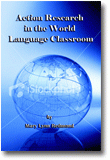
Action Research in the World Language Classroom
By:
Mary Lynn Redmond, Wake Forest University
Published 2013
The current thrust in the field of education is to improve teachers’ understanding of how research on best practices can improve student learning. The field of world language education introduces a double, perhaps a triple, bind: teachers must be able to design and deliver instruction that aligns with national expectations for developing students’ language and intercultural abilities for success in the global workplace, yet in schools across America, all K-12 students do not have the opportunity to study languages, even though research supports their astonishing facility for acquisition. Schools and teachers without resources, including time to investigate and implement evidence-based best practices, are ultimately held accountable for student performance. If world language teachers are to advocate for languages, they must use their expertise and share evidence of their students’ progress.
The American Council on the Teaching of Foreign Languages (ACTFL) recently began development of a national research priorities agenda for grades preK-16. Action research, which is classroom-centered and inquiry-based, can contribute to our profession’s efforts, as it helps us to increase awareness of the critical need for language study in grades preK-16. World language teachers can become teacher-researchers in their own classrooms, gathering deeply meaningful insights into their students’ progress that they can share with others. Teacher-researchers investigate innovative approaches in response to their questions about teaching and learning, which are rooted in daily experience. They engage their students in fresh learning activities, and student feedback helps them to make better decisions about instructional and assessment strategies. Results can be shared with stakeholders, including parents, administrators, school board members, and guidance counselors, as evidence of what all kinds of students can do in languages.
At a time in our history when we are striving to prepare teachers for 21st-century schools that prioritize global competence, Action Research in the World Language Classroom is a timely resource for the profession. It describes a natural, engaging, motivating way to contribute, particularly for preservice teachers who are shaping their views and understanding about world language instruction and the connections between research and best practices. The book includes four studies conducted by preservice teachers during their student teaching internships in North Carolina public schools. The editor hopes that their work and observations will inspire and assist world language educators at all stages of their careers.
CONTENTS
Preface. 1. Teacher Researchers in the World Language Classroom—Getting Started in the Profession With Action Research, Mary Lynn Redmond. 2. Use of Authentic Materials in Developing Oral and Written Language Ability in the Secondary Spanish Classroom, Amy C. Plyler and Mary Lynn Redmond. 3. Music and Culture in the High School Spanish Classroom, Rachel L. Will and Mary Lynn Redmond. 4. Use of Contextualized Listening Activities to Develop Listening Comprehension in the High School Spanish Classroom, John A. Mundell and Mary Lynn Redmond. 5. Use of Hispanic Dance to Develop Cultural Awareness and Language Ability in the High School Spanish Classroom, Kelsey E. Paul and Mary Lynn Redmond. About the Author.
-
Paperback9781623962012
Web price: $45.04 (Reg. 52.99)
-
Hardcover9781623962029
Web price: $80.74 (Reg. 94.99)
- eBook9781623962036

- EDU037000 - EDUCATION: Research
- EDU018000 - EDUCATION: Language Experience Approach
- EDU010000 - EDUCATION: Elementary
-
 (Re)Envisioning Social Studies Education Research
Current Epistemological and Methodological Expansions, Deconstructions, and Creations
(Re)Envisioning Social Studies Education Research
Current Epistemological and Methodological Expansions, Deconstructions, and Creations
-
 Contemporary Perspectives on English as a Medium of Instruction
Contemporary Perspectives on English as a Medium of Instruction
-
 Cultivating Democratic Literacy Through the Arts
Guiding Preservice Teachers Towards Innovative Learning Spaces in ELA Classrooms
Cultivating Democratic Literacy Through the Arts
Guiding Preservice Teachers Towards Innovative Learning Spaces in ELA Classrooms
-
 Distance Learning
Volume 20 #4
Distance Learning
Volume 20 #4
-
 Qualitative Research With Diverse and Underserved Communities
Qualitative Research With Diverse and Underserved Communities
-
 Structured Discovery Cane Travel Approach to Orientation and Mobility Concepts
Structured Discovery Cane Travel Approach to Orientation and Mobility Concepts
-
 Supporting Leaders for School Improvement Through Self-Care and Wellbeing
Supporting Leaders for School Improvement Through Self-Care and Wellbeing

